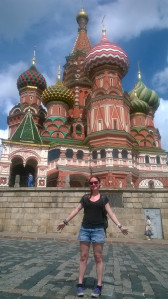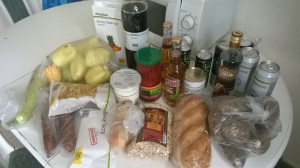
There is always a big difference between visiting a place and living in it. For one thing you don’t just restrict yourself to the city centres or the major cities of a country. You don’t still have the luxuries of a stronger currency or mobile phone plans that cover you in your native language. Living in a foreign country, well its living a completely different way. Everything is foreign, more so in some cases than others.

Weekly Shop for under 1000 RUB
Moving to Moscow in late July there was a lot of culture shock. It isn’t my first foreign country that I have lived in and in some aspects some things have been relatively easier than in some of the other countries (For example; trying to get assistance in France speaking English versus Russia is much easier in some cases).
The first things you will literally notice is that very few Russians speak English well. Fortunately, and especially for Moscow, they have added English support systems in place, with English translations in a lot of places such as the airport, metro system and major shopping centres. This is extremely important. Why? Well because Russia has that crazy alphabet – Cyrillic. If you can’t read the alphabet at least, it can certainly become overwhleming in Russia (and to be honest impossible). With majority of things only in Russian. This isn’t Europe and only some parts of Moscow have English support. But again, finding someone who speaks English is certainly a difficult task.

How to keep the train cool…hold the doors open
The first and most difficult task is buying food. Normally, when you go on holiday and visit a place, you eat out, try the local cuisine and overall don’t worry so much about budgeting your money. However, once you start living in a foreign country and earn the local currency, you soon have to start getting food within a budget. This can be quite an interesting experience; especially when you don’t know what something is. For example, a block of fat sliced up and with bread is considered a tasty snack in Russia. Hmmm, I’m always willing to try new things (and I did) but a literal block of animal fat; it’s not my cup of tea.

Holy Water for Anyone!
The next thing after the food mission you will notice is that well, getting anything done in Russia is impossible. Or feels close to it. Need a sim card? Need the internet? Need a bank account? Simple things in Russia don’t go that smoothly. Some countries really embrace setting up a new life in within their country. For example the UK and Austria have some of the easiest systems to streamline everything from bank accounts, social security numbers, health care and so forth. Russia is certainly not this type of country (and joins the other bureaucratic pains such as France, Spain and Ireland) and if you are foreign you will have been sponsored and if you’re lucky your sponsor will sort most or help to sort most of this out for you. Still things like a sim card or internet. One thing you will note; customer service does not exist. Even trying to use google translate, you will often be told to basically bugger off. So first rule for Russia, if you don’t speak Russian make besties with a Russian speak (native or not).
There are also some little cultural differences you will see straight away that can be very different especially for those from Western countries. Smiling as you walk past someone and make eye contact may be normal back home, but in Russia you will get a blank stare back. Same goes for bumping into someone, don’t expect an apology and if by your very “normal” nature apologise back, expect them to think you’re strange (I’ve even had a Russian teacher I work with ask me why I apologise to her when she ran into me – sorry Russia its the British influence!).

So many parks! This is one on my way to work
So what’s it like talking to the Ruskis? Well they’re definitely a good craic. A lot of patience is often required because the English level may not be so high. When I first moved here, we were given information about Russia and it told us that speaking English loudly and especially late at night will draw unwanted attention etc. I have never seen anyone angry by the fact we speak English (and this is even speaking with Americans), they are more intrigued by us. They listen often to even guess what the language is and then you see their brains trying to see if they can understand what’s being said. Often Russians will even interrupt to ask you where you are from. They are curious and once you do break down those initial barriers will talk forever. Alcohol also helps wildly.
What should you wear in Russia? Well honestly, it doesn’t matter! I’ve seen girls with hot pants, fluorescent pink socks and white sandals to old men with bulging stomachs and food spilled down the front. Also don’t forget the dogs! Wearing dog jeans or some other strange outfit is not uncommon to see in Russia. Honestly, you can wear what you like, anything seems to go in Russia.
The initial 2 months of living in Russia, has not been completely immersive into the culture or language. However, there is plenty of time and lots to do and everyday almost a new thing to discover about Russia. One thing you will love is the amazing parks, architecture, craziness of Russians and Russia in general (think of clothing, drinking antics and their transportation). I do say the initial 2 months, because talk to me after 6 months of darkness. As they say, winter is coming!
Important Notes
Take a copy of your passport! In Russia they have 2 passports. One for travelling outside of Russia and one, which looks like a passport, but is really an identity card. I have had some queries to my ID at the supermarket (aka buying alcohol). I give them the photocopies of my passport, sometimes they accept it, sometimes not. I also have my drivers license, which again will sometimes be accepted and sometimes not. However, I have yet to be refused using these things – if they stare at me like a crazy person I say government has it. Then they’re fine with it.
Money – yep its crazy. If you do what I do, use the beer, pasta and potato index. These three things when you compare them to other countries can help know how expensive something is relatively to the price of it in the country you’re in and save you a lot of time trying to convert things. For example in Russia the cheapest home brand beer is 28RUB, a packet of pasta is 50 RUB and a kilo of potatoes are 9 RUB. At the moment 65 RUB is 1 EUR. So you can see things in the supermarket are cheap. Go outside, using the beer index, the cheapest beer is 150RUB in a pub. Now you have laid your relative prices – would you pay 280RUB for a pint now? No, even if it is still cheap converted into a stronger currency – you live in Russia now! Next when you get a 5000 RUB note, change it immediately! You will find it really difficult to pay for things with this and I once (buying a pair of shoes at 400RUB) was almost not sold them!



